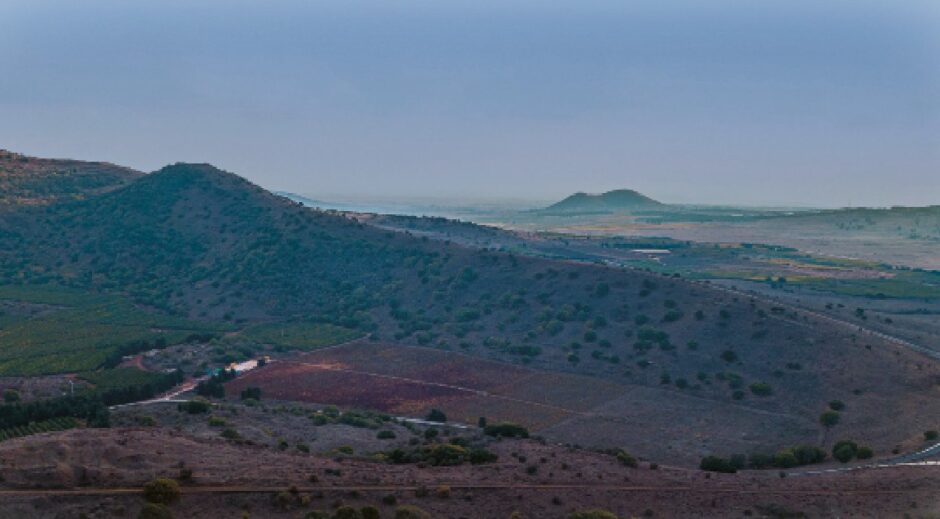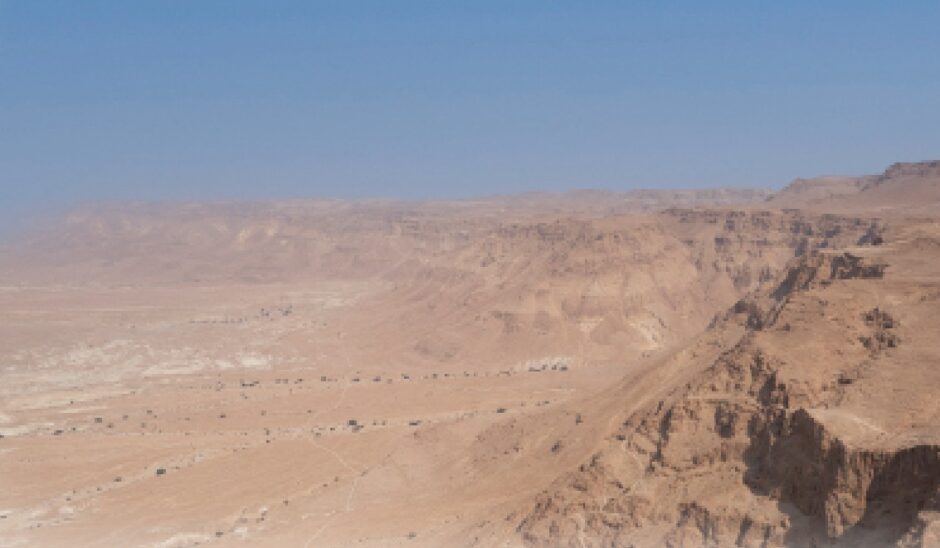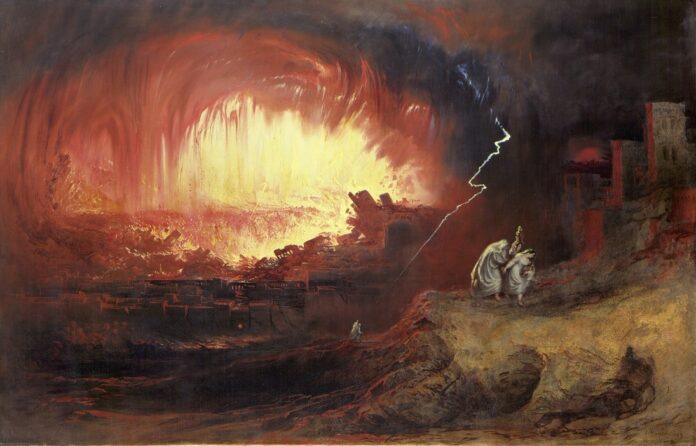Abraham and his nephew Lot travelled south through the land of Canaan as far as Egypt, and back again. By this time their flocks had multiplied so much that there was insufficient pasture to support all of them. Abraham politely suggested that Lot should take his animals, and strike out on his own (Genesis 13:1–9). With true generosity, he offered him first choice of the best grazing country.
Lot chose to go east, down to the Jordan valley, which at that time was extremely fertile, ‘well watered everywhere like the garden of the Lord’ (v. 10). Abraham stayed behind on the mountainous peaks of the central highlands. Before long, ‘Lot settled among the cities of the valley and moved his tent as far as Sodom’ (v. 12). A few chapters later, and we find him settled down in Sodom. But ‘the men of Sodom were wicked, great sinners against the Lord’ (v. 13). Lot was not only settled in the city, he sat in the gate (19:1)—a biblical expression for being a ruler or a judge. The old life had called him back—the security of solid walls and the stimulus of urban society.
The return to city life did not make Lot as happy as he hoped. Ironically, he was to prove less secure in the city of Sodom than Abraham in his tent. The fourteenth chapter of Genesis describes an invasion of the land by an army which swept down from the north, pillaging and burning as it went. Pressing southwards down the east side of the Dead Sea valley, the enemy fell upon Sodom, sacked and looted it, and took captive all the inhabitants—including Lot. Imagine his feelings, trudging northwards in chains, his house ruined, all his possessions lost, and doomed to be a slave! If only he had stayed in a tent like Uncle Abraham, safely camped up at Hebron, out of the way of the invaders!

To the Rescue
Fortunately for Lot, Abraham was both a courageous and a great-hearted man. It would have been easy for him to have washed his hands of his nephew. Had not Lot turned his back on the promises of God, and joined himself to the Canaanites? He might have said, “He’s made his bed, so let him lie on it!”. In any case, to interfere would be to risk his own life. What could one man and his household do against an army? But family ties are strong, and Abraham was absolutely confident in the guardian power of God. Quickly arming his servants, he set off with his neighbours to rescue Lot (Genesis 14:13–14).
He came across the invaders over 100 miles north at Dan. He attacked them with a classic manoeuvre, employed by his descendants right down to the present day. To make the best use of his small force against a much larger one, he attacked by night, when the enemy were not expecting trouble. He also divided his men into two groups, to confuse and distract them. The result was a rout, and Abraham was able to rescue all the prisoners. We can imagine him searching up and down for his nephew, and the amazement on Lot’s face when he realised it was his uncle who had risked everything to bring him home. Afterwards Lot was able to return to Sodom with his family. What a hero was Abraham, to set out on such a mission, and pull it off, when as far as we know he had no previous military experience!
Significantly, when he arrived back at Hebron, ‘the word of the Lord came to Abram in a vision: “Fear not, Abram, I am your shield; your reward shall be very great”’ (15:1). The God who had watched over him all the way from Ur, was still there, and he need fear no reprisals from his enemies.
As for Lot, his troubles were not yet over. In spite of God’s warning in the shape of their narrow escape from the invaders, the wickedness of the people of Sodom and Gomorrah now rose to a desperate pitch. Their acts of sexual perversion have become a byword in history. Lot saw it all around him, hated it, and yet could not bring himself to leave. Peter tells us that he was ‘greatly distressed by the sensual conduct of the wicked (for as that righteous man lived among them day after day, he was tormenting his righteous soul over their lawless deeds that he saw and heard)’ (2 Peter 2:7–8). But God was about to act in a decisive and dramatic way that would impress all subsequent generations.
The End of Sodom
Two angels visited Sodom late one evening (Genesis 19:1). In the morning they persuaded Lot to leave, leading him out by the hand, together with his daughters and his wife. Scarcely had Lot reached the shelter of the small town of Zoar further along the valley, when the earth erupted and the sky turned black with fire and smoke. Abraham, camped at Hebron high above the great rift valley, saw the conflagration next morning. ‘And he looked down toward Sodom and Gomorrah and toward all the land of the valley, and he looked and, behold, the smoke of the land went up like the smoke of a furnace’ (v. 28). Sodom and Gomorrah disappeared in a sulphurous combustion that left the whole region blasted and sterile. To this day, that formerly green and fertile valley remains a searing, white, tortured landscape of twisted rock and crusted salts, one of the most inhospitable regions on the earth. The heavy waters of the Dead Sea eventually sealed off the site of the cities of the plain.
There are two lessons we can draw from the overthrow of Sodom and Gomorrah. Firstly, we must be warned by the judgement of God against the immorality of their inhabitants. God’s standards do not change. ‘For you may be sure of this,’ wrote the Apostle Paul, ‘that everyone who is sexually immoral or impure, or who is covetous (that is, an idolater), has no inheritance in the kingdom of Christ and God. Let no one deceive you with empty words, for because of these things the wrath of God comes upon the sons of disobedience’ (Ephesians 5:5–6). This is not a popular message in our age, but there can be no compromise for Christians. They are not called to self-indulgence, but self-denial.
Secondly, there is the pointed truth that in overthrowing Sodom for its unrepentant sins, God spared Lot and his family. In spite of his weakness, Lot was basically a God-fearing man, and just as Noah had been saved from the Flood, so Lot was taken out before the judgement fell.
Jesus himself used Sodom as an illustration of what the world would be like in the day of his return to judge the world: ‘Just as it was in the days of Lot—they were eating and drinking, buying and selling, planting and building, but on the day when Lot went out from Sodom, fire and sulfur rained from heaven and destroyed them all—so will it be on the day when the Son of Man is revealed’ (Luke 17:28–30). He continued his prophecy with these remarkable words: ‘Remember Lot’s wife’ (v. 32). When you read through the account in Genesis, you find Lot’s wife lingered as they toiled towards Zoar. She had left behind in Sodom her house, her possessions, and her friends. Perhaps she did not really believe God would do what He said. Her heart was still in the doomed city, and dallying, she was overtaken by the sulphurous fumes and rapidly coated with salt (Genesis 19:26). ’Remember!’, warns Jesus. Soon he will be knocking on our door. Our civilisation is doomed to be swept away, and replaced by the Kingdom of God. This is the final hour.
Followers of Christ must be ready at any time to leave this materialistic, selfish age, with its empty rewards. Like Uncle Abraham, they are called to be sojourners, ‘as in a foreign land’ (Hebrews 11:9). Their hope lies in the age to come, in the ‘city that has foundations, whose designer and builder is God’ (v. 10), when Christ will reign over God’s Kingdom.

David Pearce


